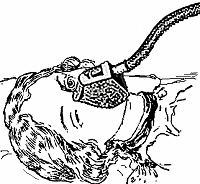 It’s not just that we don’t know how anaesthetics work – we don’t even know for sure that they work. Joshua Rothman’s review of a new book on the subject by Kate Cole-Adams quotes poignant stories of people on the operating table who may have been aware of what was going on. In some cases the chance remarks of medical staff seem to have worked almost like post-hypnotic suggestions: so perhaps all surgeons should loudly say that the patient is going to recover and feel better than ever, with new energy and confidence.
It’s not just that we don’t know how anaesthetics work – we don’t even know for sure that they work. Joshua Rothman’s review of a new book on the subject by Kate Cole-Adams quotes poignant stories of people on the operating table who may have been aware of what was going on. In some cases the chance remarks of medical staff seem to have worked almost like post-hypnotic suggestions: so perhaps all surgeons should loudly say that the patient is going to recover and feel better than ever, with new energy and confidence.
How is it that after all this time, we don’t know how anaesthetics work? As the piece aptly remarks, it’s about losing consciousness, and since we don’t know clearly what that is or how we come to have it, it’s no surprise that its suspension is also hard to understand. To add to the confusion, it seems that common anaesthetics paralyse plants, too. Surely it’s our nervous system anaesthetics mainly affect – but plants don’t even have a nervous system!
But come on, don’t we at least know that it really does work? Most of us have been through it, after all, and few have weird experiences; we just don’t feel the pain – or anything. The problem, as we’ve discussed before, is telling whether we don’t feel the pain, or whether we feel it but don’t remember it. This is an example of a philosophical problem that is far from being a purely academic matter.
It seems anaesthetics really do (at least) three different things. They paralyse the patient, making it easier to cut into them without adverse reactions, they remove conscious awareness or modulate it (it seems some drugs don’t stop you being aware of the pain, they just stop you caring about it somehow), and they stop the recording of memories, so you don’t recall the pain afterwards. Anaesthetists have a range of drugs to produce each of these effects. In many cases there is little doubt about their effectiveness. If a drug leaves you awake but feeling no pain, or if it simply leaves you with no memory, there’s not that much scope for argument. The problem arises when it comes to anaesthetics that are supposed to ‘knock you out’. The received wisdom is that they just blank out your awareness for a period, but as the review points out, there are some indications that instead they merely paralyse you and wipe your memory. The medical profession doesn’t have a good record of taking these issues very seriously; I’ve read that for years children were operated on after being given drugs that were known to do little more than paralyse them (hey, kids don’t feel pain, not really; next thing you’ll be telling me plants do…).
Actually, views about this are split; a considerable proportion of people take the view that if their memory is wiped, they don’t really care about having been in pain. It’s not a view I share (I’m an unashamed coward when it comes to pain), but it has some interesting implications. If we can make a painful operation OK by giving mnestics to remove all recollection, perhaps we should routinely do the same for victims of accidents. Or do doctors sometimes do that already…?
